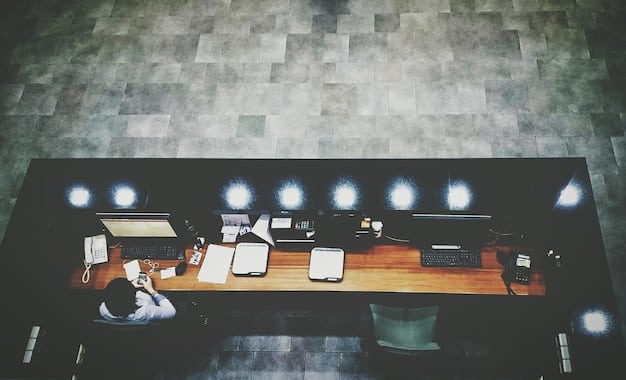K-Drama Legal Battles: Copyright Issues and Streaming in the US

K-Drama Legal Battles: Copyright Issues and the Future of Streaming in the US explores the complex landscape of copyright law and its impact on the distribution and consumption of Korean dramas in the United States, analyzing challenges and future trends.
The global popularity of Korean dramas, or K-dramas, has soared in recent years, especially in the US streaming market. This surge in popularity has also brought complex copyright issues to the forefront. Understanding these challenges is crucial for both content creators and consumers interested in K-Drama Legal Battles: Copyright Issues and the Future of Streaming in the US.
Understanding Copyright Law in the US
Copyright law in the United States serves to protect the creative works of authors, including movies, TV shows, and other artistic expressions. The law grants exclusive rights to copyright holders, allowing them to control how their work is reproduced, distributed, and displayed.
Key Aspects of US Copyright Law
Several key aspects of US copyright law are particularly relevant to the K-drama streaming industry. These include the exclusive rights granted to copyright holders, the duration of copyright protection, and the limitations and exceptions to copyright.
- Exclusive Rights: Copyright holders have the exclusive right to reproduce, create derivative works, distribute, and publicly display their works.
- Duration of Protection: Copyright protection generally lasts for the life of the author plus 70 years. For corporate works, the duration is typically 95 years from publication or 120 years from creation, whichever expires first.
- Fair Use: The fair use doctrine allows limited use of copyrighted material without permission for purposes such as criticism, comment, news reporting, teaching, scholarship, and research.
These legal frameworks are essential for understanding how K-dramas are protected and distributed in the US, influencing the availability and authenticity of content on streaming platforms.
The Rise of K-Dramas and Streaming in the US
The ascent of Korean dramas in the United States has been nothing short of phenomenal. Streaming services have played a crucial role in making K-dramas accessible to a wider audience, bypassing traditional distribution methods.
Popular Streaming Platforms for K-Dramas
Several streaming platforms have invested heavily in K-drama content, recognizing the genre’s potential and popularity. Netflix, Viki, and Kocowa are among the leading platforms that offer a wide range of K-dramas to US viewers.
- Netflix: Boasts an extensive library of original and licensed K-dramas, contributing significantly to their mainstream appeal.
- Viki: Specializes in Asian content, providing a diverse selection of K-dramas with fan-based subtitling.
- Kocowa: A joint venture by major Korean broadcasters, offering content shortly after its original airing in Korea.
The increasing availability of K-dramas on these platforms has not only fueled the genre’s popularity but also underscored the importance of addressing copyright concerns to ensure legitimate distribution.

Common Copyright Issues in K-Drama Streaming
The surge in K-drama streaming has opened up several avenues for copyright infringement. Unlicensed streaming, illegal downloads, and unauthorized distribution are among the most common issues plaguing the industry.
Specific Challenges and Examples
Examples of these issues abound, often leading to legal challenges that impact both content providers and streaming services.
- Unauthorized Streaming: Many illegal websites offer K-dramas without proper licensing, resulting in significant revenue loss for copyright holders.
- Illegal Downloads: Peer-to-peer file sharing and torrent sites facilitate the illegal downloading of K-dramas, further infringing on copyright.
- Pirated Subtitles: Unauthorized subtitles, often inaccurate and poorly translated, are distributed online, devaluing the official localized versions.
These issues create a complex legal landscape that requires constant vigilance and proactive measures to protect copyright.
Legal Battles and Lawsuits
As copyright infringement becomes more prevalent, legal battles and lawsuits have become increasingly common in the K-drama streaming industry. Copyright holders and streaming services are taking aggressive steps to protect their intellectual property.
Notable Cases and Outcomes
Several high-profile lawsuits have been filed against websites and individuals engaged in copyright infringement. These cases often result in significant damages and injunctions that prohibit further illegal activity.
- Copyright Holders vs. Illegal Streaming Sites: Many copyright holders have successfully sued illegal streaming sites, obtaining court orders that require the sites to shut down or remove infringing content.
- Streaming Services vs. Unauthorized Distributors: Streaming services have also initiated lawsuits against individuals and companies that illegally distribute their content, seeking damages and injunctive relief.
- Enforcement Actions: Legal actions often lead to the seizure of assets and criminal charges against those involved in large-scale copyright infringement.
These legal battles demonstrate the seriousness with which copyright issues are addressed in the K-drama streaming industry.

The Impact on Content Creators and Streaming Platforms
Copyright law and its enforcement have a profound impact on content creators and streaming platforms. Ensuring copyright protection is essential for sustaining the K-drama industry and encouraging future investment in content creation.
Supporting the K-Drama Ecosystem
By enforcing copyright, content creators are incentivized to produce high-quality K-dramas, knowing that their work will be protected from unauthorized use. Streaming platforms, in turn, can offer legitimate content to viewers, fostering a sustainable business model.
Copyright law directly affects content creators by giving them legal recourse against infringement, ensuring they receive proper compensation for their work. Without this protection, the incentive to create new dramas diminishes, potentially stifling the industry’s growth.
Enforcing copyright laws stabilizes the market for streaming platforms. When illegal streaming is curbed, more users subscribe to legitimate services, increasing revenue and allowing these platforms to invest further in content licensing and development.
When copyright is effectively enforced, it drives investment in high-quality content. Streaming platforms are more likely to allocate resources toward acquiring or producing top-tier K-dramas, knowing they can protect their investment from piracy.
Additionally, robust copyright protection fosters international collaboration. Korean production companies can partner with US-based streaming services with confidence, knowing that their content will be legally safeguarded in the US market.
Future Trends and Challenges
As technology evolves and streaming becomes more ubiquitous, new trends and challenges are emerging in the realm of K-drama copyright. Artificial intelligence, blockchain, and evolving consumer behavior are likely to shape the future of copyright enforcement.
Emerging Technologies and Copyright
AI and blockchain have the potential to transform copyright enforcement. AI can be used to detect and remove infringing content from online platforms, while blockchain can provide a secure and transparent means of tracking and managing digital rights.
- AI-Driven Copyright Detection: AI algorithms can analyze video and audio content to identify instances of copyright infringement, automating the process of content removal.
- Blockchain for Rights Management: Blockchain technology can create a decentralized ledger of copyright ownership, making it easier to track and enforce rights.
- Legal Framework Adaptations: Legal frameworks must adapt to address new forms of copyright infringement, such as deep fakes and AI-generated content.
Additionally, adapting to evolving consumer behaviors is crucial. As the internet landscape changes, so must the methods used to protect and enforce copyright laws in the streaming industry.
| Key Point | Brief Description |
|---|---|
| 🎬 Copyright Law | Protects K-Drama creators’ exclusive rights. |
| 🌐 Streaming Rise | Increases K-Drama accessibility in the US. |
| ⚖️ Legal Battles | Address copyright infringement. |
| 🚀 Future Trends | AI and blockchain enhance copyright protection. |
Frequently Asked Questions
▼
US copyright law protects creative works like movies and TV shows, granting exclusive rights to copyright holders. This includes the right to reproduce, distribute, and display their works.
▼
Streaming has increased K-Drama accessibility but also led to more copyright infringement, such as unauthorized streaming and illegal downloads, causing revenue loss for copyright holders.
▼
Common legal battles involve copyright holders suing illegal streaming sites and streaming services suing unauthorized distributors. These cases often seek damages and injunctions to stop illegal activities.
▼
Copyright laws incentivize content creators by ensuring they receive proper compensation for their work. This encourages the production of high-quality K-Dramas, fostering a healthier industry.
▼
Future trends include using AI for copyright detection and blockchain for rights management. Legal frameworks will need to adapt to handle new forms of infringement effectively.
Conclusion
In summary, navigating the legal battles surrounding copyright in K-dramas is crucial for the future of streaming in the US. Understanding copyright law, addressing infringement issues, and leveraging new technologies will ensure the continued success and accessibility of K-dramas for audiences in the United States.





